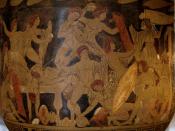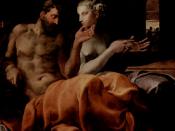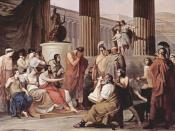"The Odyssey", an epic poem written by Homer in the 8th Century B.C., portrays Odysseus' homeward voyage as well as Odysseus' return home. In "Reunion", written by Louise Gluck, Gluck like Homer portrays Odysseus' return home after twenty years. "Reunion" works as a modern day interpretation in that it shows Odysseus' and Penelope's gathering after being apart for twenty years. Gluck portrays "Reunion" in a way that is simplistic and easy going in that Penelope believes in Odysseus right away, whereas Homer portrays a more realistic reuniting of the two in that Penelope is reluctant to believe that her husband is indeed home and alive after all of those years. Although Homer and Gluck have similar ideas about Odysseus' and Penelope's reunion, both still have their own unique ideas and differences too.
"Reunion", written by Louise Gluck, is an interpretation of the Odyssey and is very symbolic in its own way.
The title, "Reunion", shows the reader that Odysseus and Penelope are separated, and that they are brought together after all these years. In Gluck's poem, the narrator starts off and shows that Odysseus has finally returned home. "When Odysseus has returned at last/unrecognizable to Ithaca and killed/ the suitors swarming the throne room." (Gluck, ll. 1-3). In lines 1-3, Gluck shows that after twenty years, Odysseus although not as recognizable as he once was, came back to regain his kingdom and kill all the suitors in trying to wed his beloved wife Penelope. Gluck reviews the story at the beginning of her poem so that the reader is aware of what has happened. This is important not only because it provides the reader with background information, but can also help prepare the reader for future references and possibly help foreshadow certain events.
In lines 4-6, Telemachus is seen briefly, but is cleverly brought out of the picture in that Odysseus and Penelope are finally alone together after all of these years. They can finally reunite as it once was twenty years ago. "Very delicately he signals to Telemachus/ to depart: as he stood twenty years ago, / he stands now before Penelope." (Gluck, ll. 4-6). Telemachus was brought out of the picture for a specific reason. Gluck does this on purpose because finally after all of this time waiting for Odysseus' arrival, the official family is together. Gluck brings Telemachus out of the picture so that the confrontation between Odysseus and Penelope can occur, because that is indeed what we all have been waiting for. By bring Telemachus out of the scene; the reader is extremely interested to see what will finally happen between Odysseus and Penelope. It heightens the suspense and gets the reader interested in what is about to take place. Lines 5-6 are especially symbolic because Odysseus has arrived home with the confidence he had twenty years ago. The same way he stood twenty years ago, he still stands before his beloved Penelope. Odysseus is indeed a strong character, and truly believes in himself and his family. Although lines 4-6 show us his confidence, they also show us Odysseus' respect towards Penelope. Odysseus will rather be alone with his wife so that he can get reacquainted with her after all their lost time. Odysseus spoke with Penelope alone so that he can truly express himself and show Penelope how much he really loves her.
In Gluck's lines 7-8, Penelope uses symbolism through her words to portray a picture. "On the palace floor, wide bands of sunlight turning/ from gold to red." (Gluck, ll. 7-8). In this line, Gluck portrays a deeper meaning then is said, and uses colors to do so. The changes in colors are very symbolic in that they resemble the change in Odysseus journey and more importantly his life. Odysseus through out the Odyssey went through so much mentally and physically, but at the end overcame all his suffering. The colors are very symbolic and each represent something special and significant in Odysseus' life. Gold is a color of strength and wealth. That is what Odysseus represents mostly throughout his life. Eventually it changes to red, which is a color of death, blood, fire, and in a way hell. This is very ironic because in a way his journey symbolized this. The sunlight changes to red mainly to represent Odysseus' hardships, and his struggles. He first started off with everything in that he was powerful, handsome, and rich. Eventually Odysseus went on his journey and experienced many hardships along with many deaths, and eventually returned home safely back to his life or symbolically speaking back to the color gold.
In lines 8-12, Gluck shows us Odysseus' kinder and gentler side. "He tells her/ nothing of those years, choosing to speak instead/ exclusively of small things, as would be/ the habit of a man and woman long together: / once she sees who he is, she will know what he's done." (Gluck, ll. 8-12). Instead of telling Penelope stories of his journey, Odysseus speaks to Penelope as he always did. Odysseus speaks to Penelope of small things like a couple that fully understands each other, and that has been together for many years. It is amazing that Odysseus and Penelope were separated all of this time, and still have such a strong relationship. Lines 8-12 help show us that Odysseus and Penelope truly understand each other and are indeed a perfect and beautiful couple. An interesting fact about lines 8-12 are that Gluck decides to leave Penelope's reaction undefined. Gluck does this on purpose so that it leaves the reader thinking and makes this a bit more interesting. It also shows us that Odysseus is still in charge and is just like he was twenty years ago. Gluck decides to leave Penelope's reaction undefined because it is a given that her beloved husband has returned home. Both talk about small things, as a man and woman who have been together for a lifetime and fully understand each other.
Finally, Gluck ends the poem by Odysseus and Penelope reuniting and Penelope gaining full awareness of Odysseus. "And as he speaks, ah, / tenderly he touches her forearm." (Gluck, ll. 13-14). I believe the whole poem is indeed written from Penelope's point of view. Penelope tells the poem as she wants it to be seen. Line's 13-14 show us that Penelope understands that her husband is home. There is no need for Odysseus to tell Penelope that he's home because she's fully aware. Another proof of this is that Penelope is sighing, which shows the reader that she indeed understands that her beloved husband is back. Gluck is clever in that she shows Odysseus as unrecognizable to all of Ithaca, except to Penelope the woman that understands him best. "It seems that he has been gone for so long, but as soon as they meet they start were they left off." (Great Works Fellows).
Both Gluck and Homer portray similar ideas about the reunion of Odysseus and Penelope, but both are unique in their own ways and have some slight differences. The main difference that I discovered was that in the Odyssey, Penelope is reluctant to believe that the beggar is indeed Odysseus whereas in Gluck's "Reunion", Penelope believes Odysseus right away. This is proven in several quotes, one being-- "Dear nurse...the gods have touched you. They can put chaos into the clearest head or bring a lunatic down to earth. Good sense you always had. They've touched you. What is this mockery you wake me up to tell me, breaking in on my sweet spell of sleep?" (Homer, Bk. 23, ll. 11-16). In these lines, the nurse is trying to tell Penelope that her beloved husband Odysseus is indeed home. Penelope does not want to here it, and thinks the nurse is going crazy because there is no possible way that Odysseus has returned. In Gluck's "Reunion", Penelope believes in Odysseus right away when she sighs. The sigh is a sign of belief that her husband is indeed home again.
Homer's story contrasts with Gluck's in that Penelope doesn't believe Odysseus, whereas in "Reunion", there is no need for anyone to tell Penelope because she already knows. Also, Telemachus in the Odyssey try's to persuade his mother that Odysseus is home, whereas in Gluck's poem Telemachus is only told to depart and has no part in telling his mother that his father is home.
"Mother, cruel mother, do you feel nothing, drawing yourself apart this way from Father? Will you not sit with him and talk and question him? What other woman could remain so cold? Who shuns her lord, and he come back to her from wars and wandering, after twenty years? Your heart is hard as flint and never changes!" (Homer, Bk.23, ll. 98-103).
It is very interesting to me that Gluck omits this from "Reunion". I believe Gluck does this on purpose because she is concerned with getting straight to the point of Odysseus and Penelope. After all this time, we are not interested in Telemachus. We as readers want to see what is finally about to happen!
Another major contrast between Homer and Gluck is that in the Odyssey, Penelope is hard headed and stubborn, while in "Reunion" she has open arms towards Odysseus. After all of this reluctance, Penelope then states, "If really he is Odysseus, truly home, beyond all doubt we two shall know each other better than you or anyone. There are secret signs we know, we two." (Homer, Bk. 23, ll. 108-111). These lines unlike Gluck's poem show that Odysseus' and Penelope's love for each other is unbreakable, and that there are special signs that both should recall. In "Reunion", trust is a key factor, but in the Odyssey Penelope feels that she must test Odysseus to see if it is truly him. Gluck also leaves this out because she is trying to portray Penelope as a respectful and believing wife.
Unlike Gluck, Homer does not leave this part out and does it for a reason. Penelope being as smart as she is, is the only person in the poem to trick Odysseus. This is rather fitting because both of them know each other so well. "Make up his bed for him, Eurykleia. Place it outside the bedchamber my lord built with his own hands. Pile the big bed with fleeces, rugs, and sheets of purest linen." (Homer, Bk. 23, Ln. 180-183). Penelope's cleverness leads her to the truth about Odysseus, and unlike "Reunion", she has and needs proof that it was truly her husband. "There's our sign! I know no more. Could someone's else's hand have sawn that trunk and dragged the frame away?" (Homer, Bk. 23, ll. 204-206). Although both Odysseus and Penelope know each other very well, Penelope must still test Odysseus because twenty years is such a long time that anything can happen. Both Homer and Gluck told their story differently, but Homer decided to make Penelope hesitant whereas Gluck felt no need to do so. This plays a major effect because it changes the story significantly, and made both extremely interesting in their own special ways.
Both Homer and Gluck are clever in their own ways. Both portray their own ideas, some being similar while others being different. Gluck and Homer both represent their ideas in a unique and interesting style. I feel that Homer portraying Penelope's reluctance was more suitable for the poem and added an interesting twist to the Odyssey. Both Homer and Gluck represent their own thoughts on the Odyssey through their writing, and because of their unique style and intelligence they will never be forgotten!


